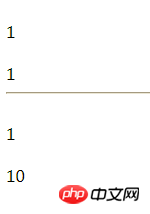
The self keyword in php can represent the current class and is generally used to call static methods or static properties of the current class. But in addition to being able to define the static attribute, static also has a function similar to self (representing the current class).
But there are still certain differences between the two. We verify it through the code:
".self::$p1;
}
public static function showInfo2(){
echo "
".static::$p1;
}
}
Class B extends A{
static $p1=10;//此处覆盖继承过来的变量p1.
public $p2=20;
}
A::showInfo();
echo "
";
B::showInfo();
echo "
";
A::showInfo2();
echo "
";
B::showInfo2();
We can see from the results:
When the method showInfo() is called, the output object is self::$p1. At this time, even though class B inherits from class A, and the inherited method is called in class B, what is displayed is always the class where the self keyword is located. Therefore, it can be said that the current class represented by self is mainly the class where the current code is located.
When the method showInfo2() is called, the output object is static::$p1. At this time, the output results are different. Class A outputs the attributes it calls. B also outputs the attributes it calls (the value of $p2 that is overwritten after inheriting the method in class A). Therefore: static represents the class in which the current method is called.
Therefore, although both self and static can represent the current class, their meanings are different.
Related recommendations:
The difference between self and static in PHP object-oriented
The above is the detailed content of Detailed explanation of the difference between self and static in php. For more information, please follow other related articles on the PHP Chinese website!




